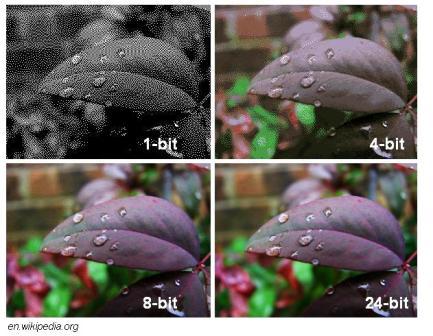- Types/Categories of Graphics :
- Bitmap Graphics
- Vector Graphics
- Grahics Quality determined by :
- Resolution
- Color Depth
----------------------------------------------------------------------------------------
Introduction of Graphics
- is the visual representation of some information
- it can be chart, drawing, photograph, diagram and the like.
- Graphics can :
- convey a lot of information quickly
- enhance other media
- tell stories
- can persuade
- clarify data
- We can obtain digital image by :
- scanning
- editing existal digital images
- clip art
- use screen capture
- paint or drawing program
 |
| With Graphics, message can be deliver effectively |
Categories of Graphics
Bitmap Graphics
- also known as raster images
- graphic made up of hundreds of coloured dots/pixels
- bitmap is a realistic photos/images
- increasing the size of a bitmap = increasing individual pixels = jagged
- Bitmap to vector = using autotracing
- bitmap images :
- photo from scanner, digital camera, drawing (photoshop)
- Advantages :
- easy to produce
- universally available - has no problem to preview in any computer
- Disadvantages :
- fixed resolution
- can not be resized
- the higher resolution, the larger file size.
- Format bitmap :
- jpg (realistic images), bmp, gif, png (transparent background)
 |
| Diagram showing pixels in a bitmap |
Vector Graphics
- vector is drawn using mathematical formulas to define lines, curves, and other attributes.
- primarily used in Hard Copy documents due to high resolutions possible
- drawing objects (such as boxes, text, circles) can be moved independently
- increasing the size of a vector = relationship between each part stays the same = same quality
- Advantages :
- easy to manipulate and edited
- can be scalable to any size without any loss (because vector use mathematical formulas)
- smaller in size file
- can convert to bitmap image (print screen)
- Disadvantages :
- Must be an expert to produce the high quality images
- More complex the image = larger the file size
- Format vector :
- pcx, wmf
 |
| Vector image showing points on a petal |
Graphics Quality
* also dependent upon the equipment
Resolution
- number of pixels contained on a display monitor (computer resolution)
- number of pixels contained in a digital image (image resolution)
- Example : 1024x768 pixels, 1200 dpi/ppi (dot per inch/pixel per inch)
- More pixels = the sharper the image look = the higher memory storage space
- 72 dpi = suitable for presentation
- 150 - 300 dpi = needed for printing purpose

Color Depth
- is the range of colour (eg. blue - how many color range of blue, )
- 1 bit = 2 color, 8 bit = 256 color, 16 bit = 65, 536 colors, 24 bit = 16.7 million colors
- the more colors per pixel, the larger the file size
- Dithering = some color have to be removed when decreasing the color depth : million color to 256 color (to decrease the file size)


Reflection :
After we know about the types of graphics and the reason of high/low of images quality, hopefully we can develop any multimedia presentation with suitable size and high in quality.
Bibliografi :


No comments:
Post a Comment